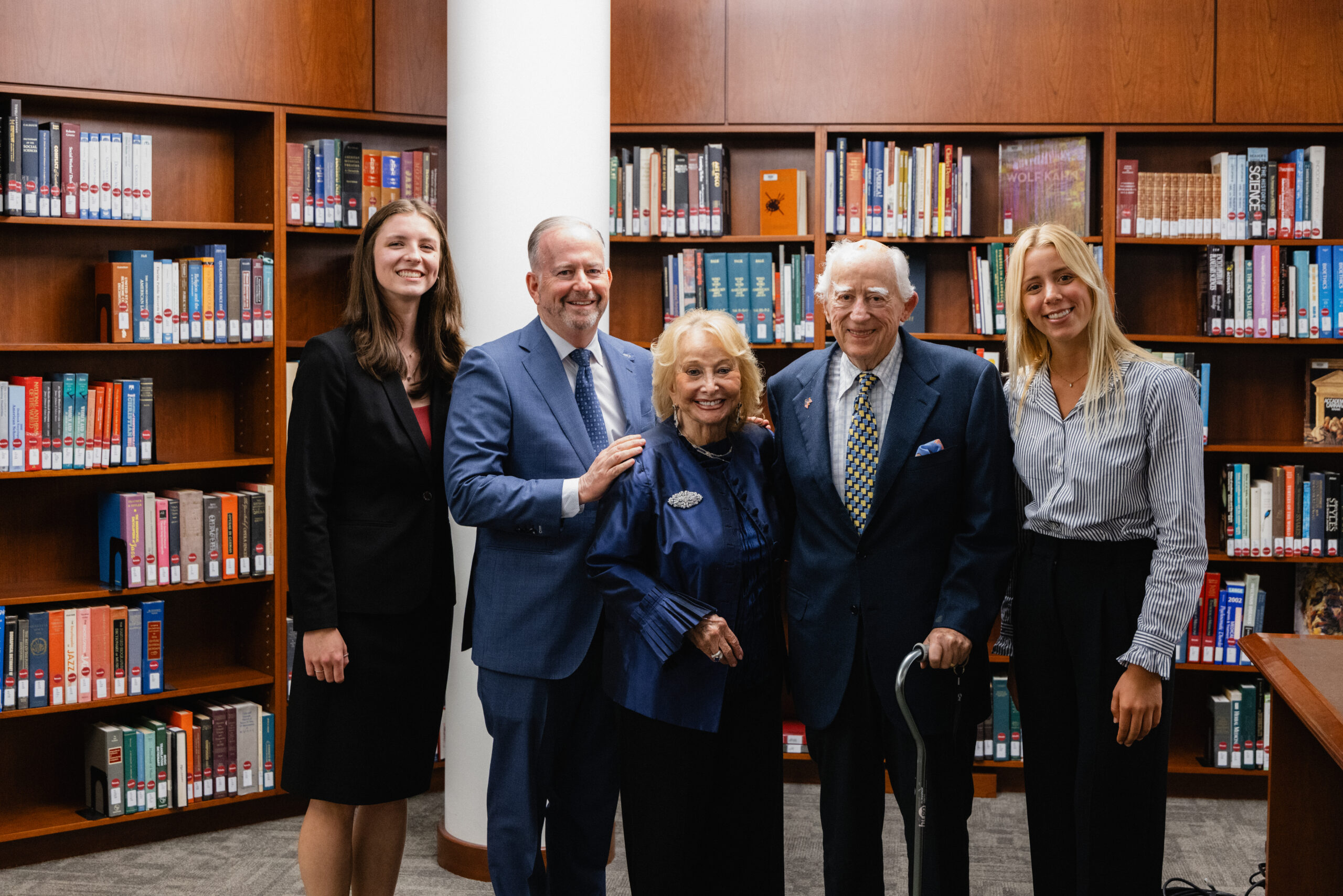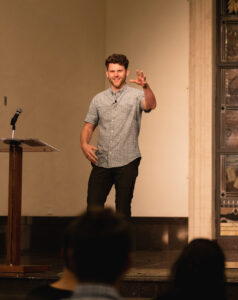
Ricky Staub had a dream job with legendary film producer Sam Mercer when he quit to pursue the dream God gave him: to start a film company and employ formerly incarcerated people.
Staub shared how the dream became a reality – and his vision to expand on his dream fulfilled – at the University’s annual Art of Storytelling Conference last month. His next dream: operate a private prison and run it like an Ivy League school.
Staub and award-winning author Stephanie Cassatly, a Jupiter, Florida, resident, spoke at the conference, themed Stories that Heal. The conference also included sessions with nursing students, a mental health counselor and a biblical storyteller. Cassatly taught a writing workshop before her talk, the final one of the conference.
Ministry professor and biblical storyteller Dr. Kathy Maxwell opened Staub’s talk Friday evening by performing vignettes from Mark 10, including stories of the rich young ruler, Jesus foretelling His crucifixion and resurrection, the disciples James and John vying for positions of power in heaven and Jesus healing blind Bartimaeus.
“They tell us something about priorities,” Maxwell said. “They tell us something about what it means to be secure. As you hear Ricky’s story, I want you to think about priorities.”
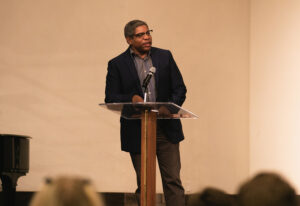
Staub grew up in a Chicago suburb and attended Azusa Pacific University, where he met veteran screenwriter Dr. Thom Parham, who now teaches at PBA. Parham introduced Staub as “teachable, tenacious and trusting.”
“When God tells you to do something and you are faithful, He will reward you,” Parham said. “Ricky is living proof of that.”
Staub’s first film, Concrete Cowboy, starred Idris Elba and was released on Netflix in April. Elba had been looking for a film that was uplifting to the Black community; Concrete Cowboy is loosely based on the Fletcher Street Riding Club, a group of Black cowboys in Philadelphia.
After Staub graduated from college, he worked for free on any movie set that would have him. His jobs included running FedEx envelopes – literally sprinting through the streets – to the FedEx store. He worked his way up until he became an assistant to Sam Mercer, who produces films for M. Night Shyamalan and Steven Spielberg.
Crisis of Faith Leads to Act of Faith
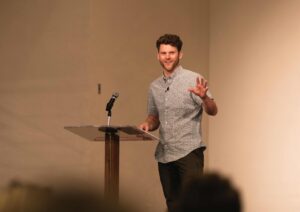
Staub’s friends were kind, hardworking people just like him, and he began to wonder why he started telling people he was a Christian if he lived no differently than they did. He started reading the Bible as an instruction manual instead of a “nice, quotable story.”
“If you actually believe that God is your father, you will do what He says,” Staub said. “Works don’t save you. Don’t leave here thinking that. But they do reveal what you believe.”
Staub made peanut butter and jelly sandwiches and started handing them out to homeless people on the street. One of the people Staub met was a homeless man who violated the terms of his probation when he broke into a building to stay warm. He went back to jail, and Staub never saw him again.
“It was the first time I learned what it means to be formerly incarcerated in this country,” Staub said.
Staub decided to use the same principle that propelled him to success – getting referred for jobs by word-of-mouth – to help those coming out of prison. He started Neighborhood Film Co., which trains former prisoners and homeless people with business skills they can apply across many different industries, “everything short of brain surgery.”
More than a decade later, the business is going strong, making commercials for Nike, Coca-Cola and Anthropologie.
People have asked Staub why he didn’t keep working in his dream job while he saved money for his passion project. “I knew in my time of prayer and reading Scripture that if I didn’t do it now, that conviction would fade for the pleasures of this earth,” Staub said.
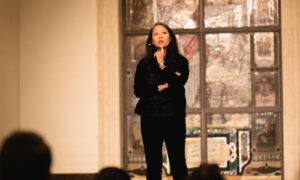
Twenty years later, Staub has earthly pleasures and the joy of seeing formerly incarcerated people set free from crippling poverty. “This beauty is a product of pursuing the gospel for the last 20 years, 1,000 small steps in a single direction,” Staub said.
Encouraging the students in the room, he added: “The decisions you make right now can set the course of your life. It started with very small steps of faith.” One of the students in the room was Will Lee, a PBA basketball player who co-starred in Staub’s short film The Cage.
The Healing Power of Writing
The conference concluded Saturday with Cassatly’s talk on The Healing Power of Writing, based on her memoir, Notice of Release: A Daughter’s Journey to Forgive Her Mother’s Killer. Cassatly was 18 when her mother was killed in a convenience store robbery in New Orleans.
Cassatly’s mother was counting the cash after closing when three men entered the store, took the cash and left. As the men were leaving, one fired a bullet that went through her chest. Two of the robbers took a plea and got a lighter sentence; the killer got a life sentence in Louisiana State Penitentiary, informally known as Angola.
Cassatly was in college in Georgia when her mother was killed. She came home for the funeral and then went back to business school, though she was “disoriented and confused.” It was as though she had been blindfolded, dropped in the middle of nowhere and had to find her way home, she said.
She graduated from college, got married and had children while thriving professionally as an ad executive. Internally, she struggled.
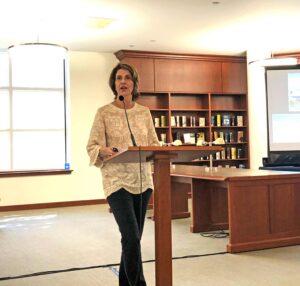
“I always had this expansive loss in my heart and in my mind,” Cassatly said. “I felt chained to my story.”
Years later, Cassatly and her husband were at a mandatory meeting to get their daughter into private school when they heard a pastor speak about prison ministry in Pahokee, Florida. His talk brought on what Cassatly called “emotional blitzkriegs.” She was raised Catholic but did not practice the faith after her mother’s death.
“I couldn’t imagine what kind of God would let this happen, or even if there was a God,” she said.
Suddenly, she could no longer ignore her mother’s killer. She ordered all of the legal documents and spoke to the detective who handled the case. She finally learned his name.
“It’s much easier to demonize someone when you don’t know anything about them, and you don’t even know their name,” Cassatly said. “I can’t say that it came from a place of goodness. It came from a place of curiosity.”
Journey to Forgiveness
She went back to a minister and a priest and talked with them about forgiveness, correcting her misconception that it meant condoning the act. Instead, she learned forgiveness meant letting go of ill will.
She was working in her office one day when a slip of paper with the phone number of the chaplain for Angola drifted out of her manila folder full of documents. She called him and said, “I am trying to forgive the man who killed my mother.”
The chaplain tracked the killer down and discovered he was terminally ill and deeply remorseful. The chaplain became an intermediary between Cassatly and her mother’s killer. At the end of their interaction, Cassatly forgave him. Two days after Christmas, she received a white envelope in the mail with a letter advising he had been released: “Subject expired on December 23, 2000.”
“It was momentous,” Cassatly said. “After my mother died and before forgiving Charles Hodges, I had a very black and white view of the world.” Once she forgave him, she began to see in gray, she said. She learned from his mother that he got into trouble at school when he was growing up. Cassatly suspected he had mental illnesses.
“We have to be careful when we call one person a victim and one person a perpetrator because at some level, we’re all victims and all perpetrators,” Cassatly said.
Cassatly said she became a writer out of desperation, trying to make sense of her past. She took her first writing class at Palm Beach Atlantic with Dr. Susan Jones and went on to earn a Master of Fine Arts from Vermont College of Fine Arts.
“I was not a good writer, but it was a good story and one that I wanted to tell well,” she said. “I see writing as a spiritual process that’s full of epiphanies.”
Today, Cassatly writes resumes for formerly incarcerated and homeless people and works to enhance a library for mentally ill children. She is also a contributor to The Forgiveness Project, an international nonprofit storytelling group.

